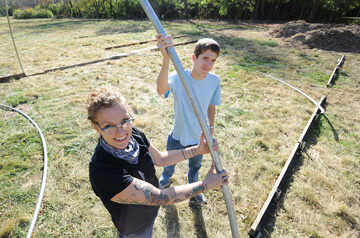Student-run farm to offer learning, teaching, research opportunities

Mary Lehmkuhl, a junior in environmental plant studies, and Michael Dzakovich, a sophomore in horticultural science, work on a project for a new student-run farming initiative. Planting of the five-acre farm site located 200 yards west of McCormick Road on State Road 26 will begin in spring. (Purdue University photo/Andrew Hancock)
In an effort to help Purdue students learn about sustainable agriculture, the College of Agriculture and the Department of Hospitality and Tourism Management collaborated this summer to develop a student-run farming initiative.
Planting of the five-acre expanse located 200 yards west of McCormick Road on State Road 26 will begin in spring. Now, students and professors meet in class once a week to hear guest speakers address important farming issues -- composting, sustainability, basic economics, and specialty crop production.
Michael Dzakovich, a sophomore in horticultural science, says, "The class is not required, but it is a great way to learn new material that is not covered in most courses. Just about everything can be applied directly to the farm."
Dzakovich decided to become part of the student-run farm to supplement his interest in plants and the outdoors while learning about all the facets of sustainable agriculture.
Although the student-run farm is in its infancy, eventually it will use natural resources to grow crops, maintain itself financially and produce food. Also, it will provide an opportunity for teachers to illustrate course concepts and for undergraduate students to conduct research projects.
Mary Lehmkuhl, a junior in environmental plant studies, hopes to use the farm to do research on small urban farms that fill a specific niche, serve their community and net a large profit.
"I believe that we need to look back to nature for answers in how to fix our agriculture system," Lehmkuhl says. "We need to let systems work together, instead of forcing them apart. The student farm is a place where we can explore ideas and try to find alternatives to the current systems."
Along with assorted vegetables and fruits, chickens, bees and bats will be housed on the farm. Chickens will aid in weed reduction and provide waste material for composting. Bat waste, rich in nitrates and phosphates, will reduce unwanted insect populations and provide a natural fertilizer for the farm. Bee apiaries are being built to allow for production of honey and other bee products.
Ivan Petkov, chef instructor in the Department of Hospitality and Tourism Management, considers HTM’s involvement with the farm as the bridge that connects planting and harvesting to food preparation and serving meals at the table.
"We could really make a difference in the way we choose to eat and live, and, most importantly, this farm gives us a chance to help the community," Petkov says. "This kind of local food sourcing is healthier with less chance of E. coli and disease and a lower carbon footprint. It will allow us to control what we grow, which results in better food prices and effective food planning."
There are no restrictions as to which disciplines can be involved in the student-run farm. Any interested student or faculty member may join the initiative. Next semester a course titled Principles of Sustainable Agriculture will be offered in conjunction with the farm.
Steve Hallett, organizer of the student-run farm and associate professor of botany and plant pathology, says, "I can’t believe we didn’t think of this before. The entire area will be a teaching lab, giving students the chance to practice what they learn."
